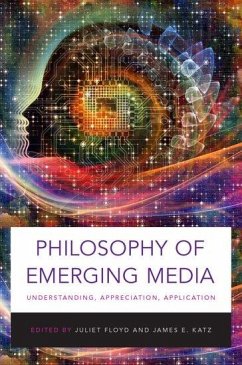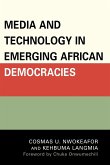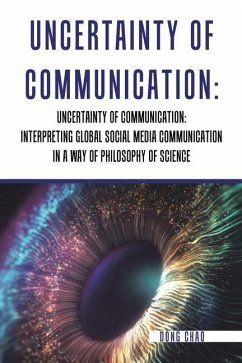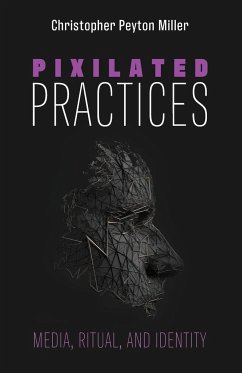- Broschiertes Buch
- Merkliste
- Auf die Merkliste
- Bewerten Bewerten
- Teilen
- Produkt teilen
- Produkterinnerung
- Produkterinnerung
This volume develops, broadens and sparks future philosophical discussion of emerging media and their ways of shaping and reshaping the habitus within which everyday lives are to be understood.
Andere Kunden interessierten sich auch für
![Emerging Media Emerging Media]() Xigen LiEmerging Media74,99 €
Xigen LiEmerging Media74,99 €![Media and Technology in Emerging African Democracies Media and Technology in Emerging African Democracies]() Media and Technology in Emerging African Democracies91,99 €
Media and Technology in Emerging African Democracies91,99 €![News Media News Media]() C. W. AndersonNews Media21,99 €
C. W. AndersonNews Media21,99 €![Uncertainty of Communication Interpreting Global Social Media Communication in a Way of Philosophy of Science Uncertainty of Communication Interpreting Global Social Media Communication in a Way of Philosophy of Science]() Dong ChaoUncertainty of Communication Interpreting Global Social Media Communication in a Way of Philosophy of Science18,99 €
Dong ChaoUncertainty of Communication Interpreting Global Social Media Communication in a Way of Philosophy of Science18,99 €![Pixilated Practices Pixilated Practices]() Christopher Peyton MillerPixilated Practices19,99 €
Christopher Peyton MillerPixilated Practices19,99 €![Stories Without Borders Stories Without Borders]() Julia SonnevendStories Without Borders34,99 €
Julia SonnevendStories Without Borders34,99 €![Navigating New Media Networks Navigating New Media Networks]() Bree McewanNavigating New Media Networks66,99 €
Bree McewanNavigating New Media Networks66,99 €-
-
-
This volume develops, broadens and sparks future philosophical discussion of emerging media and their ways of shaping and reshaping the habitus within which everyday lives are to be understood.
Hinweis: Dieser Artikel kann nur an eine deutsche Lieferadresse ausgeliefert werden.
Hinweis: Dieser Artikel kann nur an eine deutsche Lieferadresse ausgeliefert werden.
Produktdetails
- Produktdetails
- Verlag: OUP US
- Seitenzahl: 466
- Erscheinungstermin: 22. Dezember 2015
- Englisch
- Abmessung: 234mm x 156mm x 27mm
- Gewicht: 787g
- ISBN-13: 9780190260750
- ISBN-10: 0190260750
- Artikelnr.: 47863676
- Herstellerkennzeichnung
- Books on Demand GmbH
- In de Tarpen 42
- 22848 Norderstedt
- info@bod.de
- 040 53433511
- Verlag: OUP US
- Seitenzahl: 466
- Erscheinungstermin: 22. Dezember 2015
- Englisch
- Abmessung: 234mm x 156mm x 27mm
- Gewicht: 787g
- ISBN-13: 9780190260750
- ISBN-10: 0190260750
- Artikelnr.: 47863676
- Herstellerkennzeichnung
- Books on Demand GmbH
- In de Tarpen 42
- 22848 Norderstedt
- info@bod.de
- 040 53433511
Juliet Floyd is Professor of Philosophy, Boston University. She is the author of many articles on the history of eighteenth and twentieth century philosophy of mathematics, logic, and aesthetics and co-editor of Future Pasts: The Analytic Tradition in Twentieth Century Philosophy (Oxford, 2001) and Philosophical Explorations of the Legacy of Alan Turing: Turing 100 (Springer, forthcoming). James E. Katz is the Feld Professor of Emerging Media Studies at Boston University. Co-author of numerous books, including The Social Media President: Barack Obama and The Politics of Citizen Engagement, he also holds two patents. Prior to coming to Boston University in 2012, he was the Board of Governors Professor of Communication at Rutgers University.
* Introduction (Juliet Floyd and James E. Katz, Boston University)
* I. Ontology
* 1 Towards a Science of Emerging Media (Barry Smith, Buffalo)
* 2 Media and Their Emergence: The Ontology (Peter Simons, Trinity
College Dublin)
* 3 New Realism and Media: From Documentality to Normativity (Maurizio
Ferraris, Turin)
* 4 The Pygmalionic Gene: Neo-Romanticism for Emerging Media (Victor J.
Krebs, Pontifical Catholic University of Perú)
* II. Perceptions, Perspectives, Transformations
* 5 Changing Philosophical Concerns about Emergence and Media as
Emerging: The Long View
* (J.E. Katz, E. Robinson, Boston University)
* 6 Human Nature and Social Transformation (Gordon Graham, Princeton)
* 7 New Media, Old Concerns: Heidegger Revisited (Zsuzsanna Kondor,
Hungarian Academy of Sciences)
* 8 From Traditional Documentation to Network Media (Neal Thomas, Univ.
North Carolina Chapel Hill)
* III. Time, Fiction, Narrative
* 9 Emerging Media and the Philosophy of Time (Kristóf Nyiri, Hungarian
Academy of Sciences)
* 10 Bingewatching Television with Walt and Omar (Harvey Cormier, SUNY
Stonybrook)
* 11 Media, Emergence and the Analogy of Art (John Haldane,
Edinburgh/Notre Dame)
* 12 Sadness and Photography: Barthes and Benjamin (Ilit Ferber, Tel
Aviv)
* IV. Emergence, Agency, Mind
* 13 Turing, Wittgenstein and Emergence (Juliet Floyd, Boston
University)
* 14 Where is My Mind? Anscombe on Agency (Valérierie Aucouturier,
Paris)
* 15 Agential Properties in Computer Games (John Richard Sageng, Oslo)
* 16 Will Emerging Media Create a Collective Mind? (David Ramsay
Steele, Chicago)
* V. Symbols, Speech Acts
* 17 Plato and Aristotle on Writing (David Roochnik, Boston University)
* 18 Leibniz on Symbolism as a Cognitive Instrument (Sybille Krämer,
Freie Universität, Berlin)
* 19 Semantic and Pragmatic Stances toward Emerging Media (John Grey,
Boston University)
* 20 Speech Acts and the Internet: Austin to Bourdieu and Fraenkel
(Bruno Ambroise, CNRS)
* VI. Social Media, Big Data
* 21 Explorations in the Grammar of "Being in touch ": From Locke to
Winch, from SMS to Skype (Richard H.R. Harper, Microsoft Research)
* 22 Emerging Categories of Media Institutions (Lars Lundsten,
Helsinki)
* 23 Philosophy of Critique: the New Media (Ronald E. Day, Indiana)
* 24 Big Data and The Big "Conversation " (Gary King, Harvard
(interview))
* CODA: Conclusion and a Perspective on Future Directions (Juliet
Floyd, James Katz, and Elizabeth Robinson, Boston University)
* I. Ontology
* 1 Towards a Science of Emerging Media (Barry Smith, Buffalo)
* 2 Media and Their Emergence: The Ontology (Peter Simons, Trinity
College Dublin)
* 3 New Realism and Media: From Documentality to Normativity (Maurizio
Ferraris, Turin)
* 4 The Pygmalionic Gene: Neo-Romanticism for Emerging Media (Victor J.
Krebs, Pontifical Catholic University of Perú)
* II. Perceptions, Perspectives, Transformations
* 5 Changing Philosophical Concerns about Emergence and Media as
Emerging: The Long View
* (J.E. Katz, E. Robinson, Boston University)
* 6 Human Nature and Social Transformation (Gordon Graham, Princeton)
* 7 New Media, Old Concerns: Heidegger Revisited (Zsuzsanna Kondor,
Hungarian Academy of Sciences)
* 8 From Traditional Documentation to Network Media (Neal Thomas, Univ.
North Carolina Chapel Hill)
* III. Time, Fiction, Narrative
* 9 Emerging Media and the Philosophy of Time (Kristóf Nyiri, Hungarian
Academy of Sciences)
* 10 Bingewatching Television with Walt and Omar (Harvey Cormier, SUNY
Stonybrook)
* 11 Media, Emergence and the Analogy of Art (John Haldane,
Edinburgh/Notre Dame)
* 12 Sadness and Photography: Barthes and Benjamin (Ilit Ferber, Tel
Aviv)
* IV. Emergence, Agency, Mind
* 13 Turing, Wittgenstein and Emergence (Juliet Floyd, Boston
University)
* 14 Where is My Mind? Anscombe on Agency (Valérierie Aucouturier,
Paris)
* 15 Agential Properties in Computer Games (John Richard Sageng, Oslo)
* 16 Will Emerging Media Create a Collective Mind? (David Ramsay
Steele, Chicago)
* V. Symbols, Speech Acts
* 17 Plato and Aristotle on Writing (David Roochnik, Boston University)
* 18 Leibniz on Symbolism as a Cognitive Instrument (Sybille Krämer,
Freie Universität, Berlin)
* 19 Semantic and Pragmatic Stances toward Emerging Media (John Grey,
Boston University)
* 20 Speech Acts and the Internet: Austin to Bourdieu and Fraenkel
(Bruno Ambroise, CNRS)
* VI. Social Media, Big Data
* 21 Explorations in the Grammar of "Being in touch ": From Locke to
Winch, from SMS to Skype (Richard H.R. Harper, Microsoft Research)
* 22 Emerging Categories of Media Institutions (Lars Lundsten,
Helsinki)
* 23 Philosophy of Critique: the New Media (Ronald E. Day, Indiana)
* 24 Big Data and The Big "Conversation " (Gary King, Harvard
(interview))
* CODA: Conclusion and a Perspective on Future Directions (Juliet
Floyd, James Katz, and Elizabeth Robinson, Boston University)
* Introduction (Juliet Floyd and James E. Katz, Boston University)
* I. Ontology
* 1 Towards a Science of Emerging Media (Barry Smith, Buffalo)
* 2 Media and Their Emergence: The Ontology (Peter Simons, Trinity
College Dublin)
* 3 New Realism and Media: From Documentality to Normativity (Maurizio
Ferraris, Turin)
* 4 The Pygmalionic Gene: Neo-Romanticism for Emerging Media (Victor J.
Krebs, Pontifical Catholic University of Perú)
* II. Perceptions, Perspectives, Transformations
* 5 Changing Philosophical Concerns about Emergence and Media as
Emerging: The Long View
* (J.E. Katz, E. Robinson, Boston University)
* 6 Human Nature and Social Transformation (Gordon Graham, Princeton)
* 7 New Media, Old Concerns: Heidegger Revisited (Zsuzsanna Kondor,
Hungarian Academy of Sciences)
* 8 From Traditional Documentation to Network Media (Neal Thomas, Univ.
North Carolina Chapel Hill)
* III. Time, Fiction, Narrative
* 9 Emerging Media and the Philosophy of Time (Kristóf Nyiri, Hungarian
Academy of Sciences)
* 10 Bingewatching Television with Walt and Omar (Harvey Cormier, SUNY
Stonybrook)
* 11 Media, Emergence and the Analogy of Art (John Haldane,
Edinburgh/Notre Dame)
* 12 Sadness and Photography: Barthes and Benjamin (Ilit Ferber, Tel
Aviv)
* IV. Emergence, Agency, Mind
* 13 Turing, Wittgenstein and Emergence (Juliet Floyd, Boston
University)
* 14 Where is My Mind? Anscombe on Agency (Valérierie Aucouturier,
Paris)
* 15 Agential Properties in Computer Games (John Richard Sageng, Oslo)
* 16 Will Emerging Media Create a Collective Mind? (David Ramsay
Steele, Chicago)
* V. Symbols, Speech Acts
* 17 Plato and Aristotle on Writing (David Roochnik, Boston University)
* 18 Leibniz on Symbolism as a Cognitive Instrument (Sybille Krämer,
Freie Universität, Berlin)
* 19 Semantic and Pragmatic Stances toward Emerging Media (John Grey,
Boston University)
* 20 Speech Acts and the Internet: Austin to Bourdieu and Fraenkel
(Bruno Ambroise, CNRS)
* VI. Social Media, Big Data
* 21 Explorations in the Grammar of "Being in touch ": From Locke to
Winch, from SMS to Skype (Richard H.R. Harper, Microsoft Research)
* 22 Emerging Categories of Media Institutions (Lars Lundsten,
Helsinki)
* 23 Philosophy of Critique: the New Media (Ronald E. Day, Indiana)
* 24 Big Data and The Big "Conversation " (Gary King, Harvard
(interview))
* CODA: Conclusion and a Perspective on Future Directions (Juliet
Floyd, James Katz, and Elizabeth Robinson, Boston University)
* I. Ontology
* 1 Towards a Science of Emerging Media (Barry Smith, Buffalo)
* 2 Media and Their Emergence: The Ontology (Peter Simons, Trinity
College Dublin)
* 3 New Realism and Media: From Documentality to Normativity (Maurizio
Ferraris, Turin)
* 4 The Pygmalionic Gene: Neo-Romanticism for Emerging Media (Victor J.
Krebs, Pontifical Catholic University of Perú)
* II. Perceptions, Perspectives, Transformations
* 5 Changing Philosophical Concerns about Emergence and Media as
Emerging: The Long View
* (J.E. Katz, E. Robinson, Boston University)
* 6 Human Nature and Social Transformation (Gordon Graham, Princeton)
* 7 New Media, Old Concerns: Heidegger Revisited (Zsuzsanna Kondor,
Hungarian Academy of Sciences)
* 8 From Traditional Documentation to Network Media (Neal Thomas, Univ.
North Carolina Chapel Hill)
* III. Time, Fiction, Narrative
* 9 Emerging Media and the Philosophy of Time (Kristóf Nyiri, Hungarian
Academy of Sciences)
* 10 Bingewatching Television with Walt and Omar (Harvey Cormier, SUNY
Stonybrook)
* 11 Media, Emergence and the Analogy of Art (John Haldane,
Edinburgh/Notre Dame)
* 12 Sadness and Photography: Barthes and Benjamin (Ilit Ferber, Tel
Aviv)
* IV. Emergence, Agency, Mind
* 13 Turing, Wittgenstein and Emergence (Juliet Floyd, Boston
University)
* 14 Where is My Mind? Anscombe on Agency (Valérierie Aucouturier,
Paris)
* 15 Agential Properties in Computer Games (John Richard Sageng, Oslo)
* 16 Will Emerging Media Create a Collective Mind? (David Ramsay
Steele, Chicago)
* V. Symbols, Speech Acts
* 17 Plato and Aristotle on Writing (David Roochnik, Boston University)
* 18 Leibniz on Symbolism as a Cognitive Instrument (Sybille Krämer,
Freie Universität, Berlin)
* 19 Semantic and Pragmatic Stances toward Emerging Media (John Grey,
Boston University)
* 20 Speech Acts and the Internet: Austin to Bourdieu and Fraenkel
(Bruno Ambroise, CNRS)
* VI. Social Media, Big Data
* 21 Explorations in the Grammar of "Being in touch ": From Locke to
Winch, from SMS to Skype (Richard H.R. Harper, Microsoft Research)
* 22 Emerging Categories of Media Institutions (Lars Lundsten,
Helsinki)
* 23 Philosophy of Critique: the New Media (Ronald E. Day, Indiana)
* 24 Big Data and The Big "Conversation " (Gary King, Harvard
(interview))
* CODA: Conclusion and a Perspective on Future Directions (Juliet
Floyd, James Katz, and Elizabeth Robinson, Boston University)








